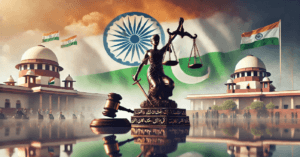Is Calling an Indian Muslim a “Pakistani” a Crime? Legal Perspectives and Implications
In India, calling an Indian Muslim a “Pakistani” is not necessarily a crime in private, but context matters. The Supreme Court ruled that it may be in poor taste but doesn’t legally harm religious sentiments. However, when used in public to incite violence, it could qualify as hate speech under the law. A Delhi court recently held that BJP leader Kapil Mishra’s use of the term aimed to promote religious hostility, a criminal offense.
Legal experts emphasize that speech in private is less likely to be criminalized, but public use can be. Some argue for stronger anti-discrimination laws to better protect minorities. Others believe civil suits for defamation are more appropriate than criminal charges. The issue reflects deeper societal prejudices, suggesting the need for broader reforms.

Is Calling an Indian Muslim a “Pakistani” a Crime? Legal Perspectives and Implications
In India, calling someone “Pakistani” can sometimes lead to legal trouble, but it depends on the situation. Earlier this year, the Supreme Court said that using the term “Pakistani” in private might be rude, but it doesn’t legally harm religious feelings. However, in March 2024, a Delhi court ruled that BJP leader Kapil Mishra’s use of the word “Pakistanis” to describe protesters against the Citizenship (Amendment) Act was an attempt to stir up religious tension. This shows that the context in which the word is used matters a lot.
Under India’s new Bharatiya Nyaya Sanhita law, which replaced the old Indian Penal Code’s Section 153A in 2024, promoting religious hatred is a crime. This law was invoked when BJP MLA Gopal Sharma called someone “Pakistani” in the Rajasthan Assembly. Legal experts say that calling someone “Pakistani” can be considered a crime if it’s done publicly to provoke violence or hatred. However, using the term in private conversations is less likely to be seen as a criminal act. This is because India’s Constitution, under Article 19(2), only regulates public speech, not private discussions.
The word “Pakistani” has been used in Indian politics for decades, often as a way to target Muslims. For example, in 1994, Shiv Sena leader Bal Thackeray used the term to describe Muslims during the 1992-93 Bombay riots. At the time, the Bombay High Court dismissed the case against Thackeray, saying that both communities had started living peacefully again. But in 2024, the Delhi court took a different stance. It ruled that calling someone “Pakistani” can imply that Indian Muslims are not loyal to India, which could be seen as an offense under Section 197 of the new law. This section deals with statements that harm national unity.
Legal experts stress that the context of using the word “Pakistani” is key. If it’s used to spread hate or incite violence, it can be treated as a crime. But if it’s used in private, it’s unlikely to be considered illegal. Some experts also believe that cases involving insults or defamation should be handled through civil lawsuits rather than criminal charges. This would prevent the justice system from being misused.
There’s also a call for stronger laws against discrimination. Current laws don’t do enough to address hate speech or protect religious minorities from discrimination. Many argue that India needs a comprehensive law to safeguard minorities from both hate speech and discrimination, both in criminal and civil cases. This would help ensure that everyone is treated fairly and that harmful speech is properly addressed.
In summary, calling someone “Pakistani” in India can be a crime if it’s done publicly to create religious or national division. However, using the term in private is less likely to lead to legal consequences. The context in which the word is used is crucial, and experts believe that stronger laws are needed to protect minorities from hate speech and discrimination. While the term has been used politically for years, its impact on national unity and religious harmony continues to be a sensitive issue in India.
You must be logged in to post a comment.